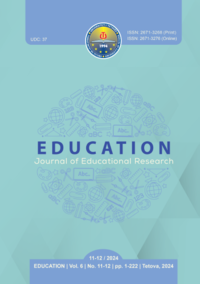THE PRAGMATIC AND SOCIOLINGUISTIC APPROACH TO FOLKLORE
THE PRAGMATIC AND SOCIOLINGUISTIC APPROACH TO FOLKLORE
Author(s): Rriollza AgolliSubject(s): Education
Published by: University of Tetova
Keywords: social context; pragmatic and sociolinguistic theory; language level; proverbs; folklore.
Summary/Abstract: In 1846, William Thoms introduced the word folklore, and since then arguments about the true definition of the word have been widely developed (Dundes, 1965). Folklore includes all knowledge, meanings, values, attitudes, assumptions, feelings, and beliefs transmitted in traditional forms orally or by customary examples. The variability in the context of a community and the functional and stylistic features of folklore materials, at a time of social change (Hendricks, 2019), reveal the universal character of the connection of folklore with pragmatic and sociolinguistics. The sociolinguistic method of description and analysis (Gumperz, 2003) of the linguistic features of the folklore text, in social contexts, shows that its structure can be integrated into the linguistic structure, while Pragmatic Theory (Lawal, 2012) identifies two main structures: the structure surface and background texture. The main structures consist of six levels. The first level is linguistic and is located in the surface structure. The linguistic level is the level at which utterances are produced: phonological, morphological, syntactic, lexical, and semantic features. The other levels are further divided into contexts and competencies symmetrically. Taking these into account, the different approaches to the study of the folklore text as a linguistic object are easily distinguishable.The object of this paper is the pragma-sociolinguistic approach to proverbs. The study of the formal features of proverbs expands, including the social contexts in which they are used and the participants in the acts of communication. Our paper relies on the pragma-sociolinguistic theory of Adegbija 1982, revised in 1987. This theory posits that the pragma-sociolinguistic concept (cf. 1982) refers to the various speech contexts facilitating effective communication. The concept of pragma-sociolinguistics means historical, personal, environmental, sociocultural features and linguistic aspects of all factors related to the context in which a certain discourse occurs.
Journal: EDUCATION – Journal of Educational Research
- Issue Year: 6/2024
- Issue No: 11-12
- Page Range: 101-106
- Page Count: 6
- Language: English

